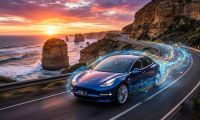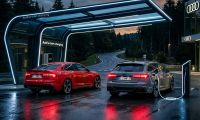Three weeks ago Gov. Jerry Brown and NRG announced a deal that is a huge step toward building the electric car charging infrastructure that California needs to meet the states environmental goals, but some electric car advocates are raising concerns and questioning whether the the deal will be good for California's electric car drivers. Late last week NRG provided a pair of documents previewing the proposed agreement between the company and the California Public Utilities Commission (CPUC). The documents answer most of the concerns and provide a glimpse into how the project is likely to progress over the next four years.
NRG's settlement deal with California breaks down to a $20 million payment to the CPUC, and a $100 million amount that will pay for a large electric car charging network. The network will be built and owned by NRG's subsidiary eVgo, a company which is already operating electric car charging stations in Texas. The documents we received from NRG's David Knox break out some of the details of how that $100 million will be allocated to different projects. However the deal is not finalized and has not been presented to the Federal Energy Regulatory Commission for approval, meaning it's possible the details will change.
A $50.5 million investment in a minimum of 200 electric vehicle (EV) fast-charging Freedom Station sites: The Freedom Stations consist of one DC Fast Charging station (CHADEMO), the wiring for a second fast charging station, plus some level 2 J1772 charging stations. NRG expects to install 110 sites in the Los Angeles Basin, 55 in the San Francisco Bay Area, 15 in the San Joaquin Valley, and 20 in San Diego County. Completion of the stations will be spread over four years, with 20% in year 1, 30% in year 2, 30% in year 3, 20% in year 4. The Freedom Stations will be owned and operated by NRG's subsidiary, eVgo.
The stations will be available both to eVgo members, and on a pay-as-you-go basis costing "no more than $10 per charge during off-peak hours and $15 per charge on-peak." This directly answers the Open Access concern raised by some advocates.
A concern we've raised before is the choice to support the CHADEMO DC Fast Charging protocol, rather than wait for the SAE J1772 committee DC Fast Charging system currently being debated. The committee is expected to standardize on a different DC Fast Charging system, and it stands to reason the investment in CHADEMO stations could be rendered obsolete. NRG is committing to support both current DC Fast Charging systems (CHADEMO) and the future system being standardized by the SAE committee. How this works out in practice is yet to be determined, and at worst NRG will have to install a second fast charging station supporting the SAE DC Fast Charging protocol alongside the existing CHADEMO stations.
A $40 million investment in electrical infrastructure to support the installation of a minimum of 10,000 additional charging stations: This consists of all the wiring and trenching and conduit necessary to make it possible to install an electric car charging station. NRG calls these a "make ready" because the effect is to "make" a location "ready" to install an electric car charging station. There will be at least 1,000 "make ready" locations, primarily at multi-family housing locations (apartment buildings) and workplaces, but also areas of public interest like schools and hospitals.
The distribution of make ready locations will be in similar proportions to the Freedom Stations (the majority in the LA Basin), except that each "make ready" must be within the service area of an Investor Owned Utility. The cities that run their own municipal electric utility, that are not Investor Owned, will not be allowed to have any of the NRG-installed make ready locations. The reason for this has to do with arcanities of the legal settlement this deal springs from.
The make ready sites will be owned by property owners, and support both level 1 and level 2 charging station connections. NRG will not be installing the charging stations at these sites, just the wiring required to do so. The wiring will be compatible with all standard level 1 and level 2 charging stations. There is an 18 month period after building each make ready site, during which NRG/eVgo will have the rights to install a charging station at the site. After that 18 month period eVgo competitors will be free to install charging stations at the make ready sites.
A concern that's been raised is whether the settlement could dry up opportunities for the existing networks to expand further. The terms described so far gives NRG preferential access to the make ready sites, and it's plausible NRG could choose to take those sites for themselves, depending on how the company sees its business interests unfold. On the other hand, NRG could leave the make ready sites for others but competitors will be locked out for 18 months.
NRG says the company is "is taking an upfront risk in a nascent market that will create greater opportunity for EV providers" and that the agreement does not prevent competitors from making similar infrastructure investments. Instead of cutting off NRG's competitors from accessing potential charging station sites, the company would have us believe the large increase in charging station infrastructure will make electric cars more attractive, resulting in increased opportunities for all charging station network operators. The 1,000 make ready sites represents a fraction of the charging station infrastructure that should be installed to support full adoption of electric vehicles.
A $5 million investment in development and deployment of new EV charging services: This is a loosely defined allotment of money to long range research and development projects. NRG suggests it could be used to develop battery based electricity storage systems, or higher powered fast charging stations, or a vehicle-to-grid pilot program. An electricity storage system would reduce the cost for running a fast charging system by eliminating the demand charges. Today's DC fast charge stations are connected to 480 volt 3-phase AC power connections, and while a car is charging the station will draw tens of kilowatts of power. This type of usage results in high fees because of the spikes in electricity demand. Additionally eVgo could earn secondary revenue by configuring the electricity storage system to also provide grid stabilization services.
A $4 million investment in additional EV charging services and EV charging technology: This is also a loosely defined allotment of money, this time for undefined long range research and development that is yet to be agreed between NRG and the CPUC.
NRG has said little so far about interoperability between the electric car charging networks. When pressed on this, NRG's David Knox suggested the market right now is immature likening it to the early days of cell phones and incompatible cell networks. Where in the past cell phone users had to worry about roaming charges or an inability to connect to the right cell network, those things are in the distant past. As electric vehicle charging networks develop perhaps, as Knox suggested, interoperability agreements will be made between the networks. In the meantime this means we'll be stuck carrying membership cards for several networks.
Concerning transparency, or the ability of an electric car driver to know the cost to recharge at a given station, we have yet to see the eVgo stations in California. NRG promises the stations will be open to access to any electric car driver, but will there be signage disclosing the cost to use the station? Today the Blink network has a known cost to charge, that's the same at all Blink charging stations. However on the ChargePoint network the cost to use each station varies from station to station, with some costing $3.00 per hour (or more), and the ChargePoint stations do not have signage disclosing the cost.
Some describe the $10-15 cost for a non-eVgo-member to charge at a Freedom Station as excessive, as is the $7-15 fee to use the 350Green fast charge stations. is this price gouging? Depends on what value you place on being able to refill the battery pack quickly. The cost is high enough to make the cost-per-mile much higher than a gasoline car owner's cost-per-mile. However, there is the high demand charges eVgo and 350Green have to pay to operate the fast charging stations.
The success of the electric car charging stations depends on whether the deployment locations make sense. NRG is committing themselves to consult with local government leaders, electric vehicle owners, advocacy groups, and other stakeholders, to "ensure that the network meets the needs of EV owners, present and future." An example of this outreach is a phone call by the director of eVgo's deployment in California, over last weekend, with a joint meeting of the BayLEAF and Silicon Valley Electric Auto Association groups. He spent 5-10 minutes discussing the plan and fielding questions from the audience of over 100 electric vehicle owners. The company is reaching out to set up face-face meetings with local electric car owner groups throughout California.
Set Torque News as Preferred Source on Google











Comments
10,000 make ready sites. Not
Permalink
10,000 make ready sites. Not the 1,000 you reference. Where is the balance from other service providers who have risked hundreds of nmillions in the market, not just converted a $940 m liability owed to CA rate payer?
Do you work for NRG? Certainly not fair and balanced, but a pure pure NRG puff piece.
To: JRRead: Your point is
Permalink
In reply to 10,000 make ready sites. Not by JRRead (not verified)
To: JRRead:
Your point is well taken.....you ask if the author works for NRG,...altough it would be forthright if you identified yourself and your company too.
- Are you the same JR Read that is the President of ECOtality? (BL!NK service provider)
- The same JR Read that is being investigated by Congress for an unexplained "missing" $7 million dollars from DOE grants (from the US taxpayers)?
- The same JR Read that has been accused of giving his son, son's father-in-law, wife, and who knows who else, large payouts and "bonuses" from the DOE grants that were given to install EVCS for the EV driving taxpayers?
- The same JR Read that is President of a company that is losing millions of dollars? Gues you could say that it "disappeared" in a BL!NK.....
- The same JR Read that that chose to offer a "closed" network to EV drivers that aren't subscribers to your expensive system?
Should I go on?? Or should I let Congress ask you and your family the painful questions?? Does "integrity" mean anything to you?
RK
If you are the same "JR Read"......then perhaps you should remember that people that live in glass houses shouldn't throw stones - because we might just start throwing back! But hey.... I'm sure that it was fun while it lasted.......
First, this article is one
Permalink
In reply to 10,000 make ready sites. Not by JRRead (not verified)
First, this article is one half of a two-article piece. This article presents NRG's answers to criticisms, and the criticisms are presented in the other article, linked from this one.
The material NRG provided me said the proposal is for 10,000 make-ready outlets, at 1,000 sites.
10,000 make ready sites. Not
Permalink
10,000 make ready sites. Not the 1,000 you reference. Where is the balance from other service providers who have risked hundreds of nmillions in the market, not just converted a $940 m liability owed to CA rate payer?
Do you work for NRG? Certainly not fair and balanced, but a pure pure NRG puff piece.
I would welcome the opportunity to present the REAL situation that will stiffle EV investment in California.